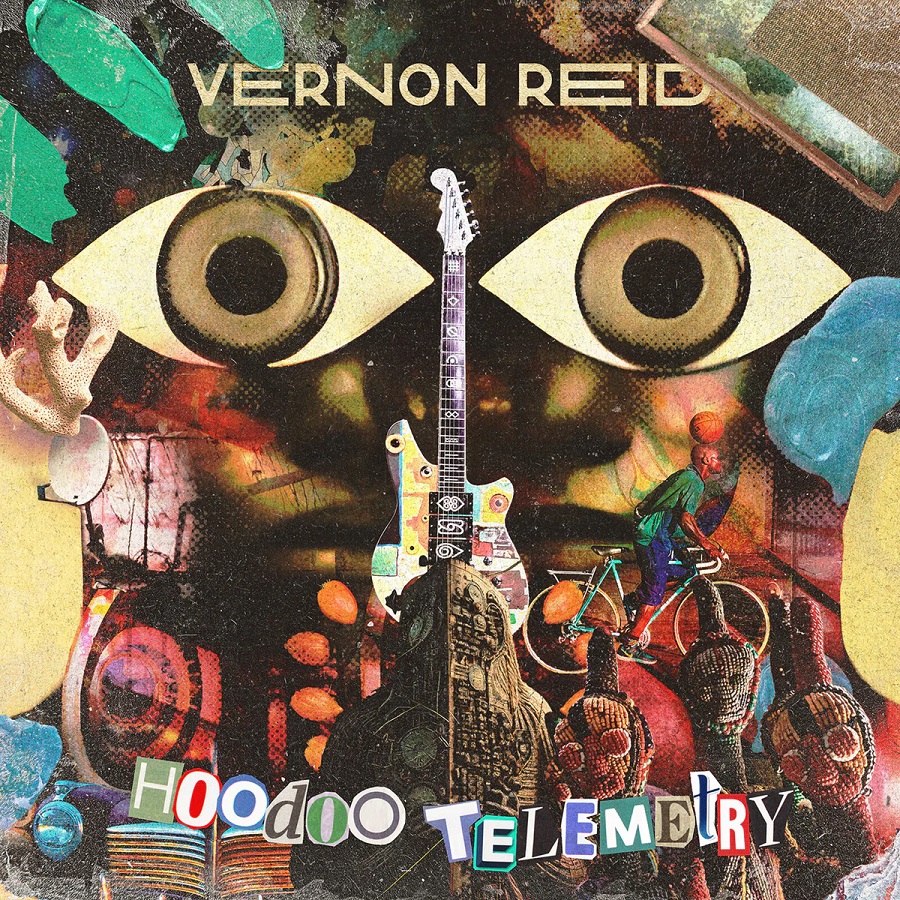Vernon Reid – Hoodoo Telemetry
You have been warned: this album is going to hurt. It is the pain you feel with an uncomfortable truth, one that gets under your skin and stays there. With razor-sharp strikes, Vernon Reid removes this pain, but through carefully placed incisions, he creates new torments that gnaw their way into our subconscious. Nowhere does Reid grant his listener a moment’s rest: it is a total confrontation with a guitarist who lays bare his soul with an unbridled, unfiltered temperament. “Hoodoo Telemetry” is in your face. Full in the mush.
For decades now, Reid has been one of the most dynamic and hybrid figures in American music. Born in London in 1958, raised in Brooklyn, he learnt not only the hard riffs and thundering grooves of rock, metal and funk, but was also shaped by jazz, avant-garde experiment, hip-hop and electronica. Reid is thus one of the most colourful and at the same time most idiosyncratic guitarists of his time, just like his signature guitar from Reverend with the specially designed railhammer humbucker pickups, three of which are screwed onto the body. Reid is not only idiosyncratic but also thunderously loud.
He first opens fire with Ronald Shannon Jackson’s Decoding Society and projects such as Black Rock Coalition (co-founded by Reid), in which Reid strives for more space and recognition for Black artists outside blues and soul, the traditional genres for Black musicians, so to speak. The general public, however, will know Reid primarily from Living Colour, which brings a combination of politically charged lyrics, virtuoso guitar work and cross-pollinations between rock, metal and funk. Reid continues to make solo albums alongside Living Colour: in 1996, “Mistaken Identity” appears, and in 2004, “Known Unknown”.
In “Hoodoo Telemetry” everything comes together. Reid himself calls it ‘a piece of my all-over-the-place mind’: some songs are brand new, other ideas have been rediscovered in old archives, as if he is unravelling a tangle of memories, influences and frustrations. We are sucked into that tangle. There is no way back; we literally go through the “Door of No Return”, essentially a long solo with the typical, biting sound that Reid extracts from his guitar. It is actually the weakest number on the record, because from “Freedom Jazz Dance” onwards, it becomes interesting, and Reid succeeds in laying down a mix of styles. The funk and hip-hop influences that have accompanied him since the 1980s are enriched with electronica, jazz harmonies and wailing metal riffs. You also hear to whom Reid is indebted: in “Freedom Jazz Dance” we discover a hint of Zappa, in “Politician” you hear echoes of Cream and Hendrix, whilst “Beautiful Bastard” has a Prince-like vibe—before Reid once again delivers such a biting solo.
The centre of gravity is formed by “Bronx Paradox” and “In Effigy”, tracks that, in terms of intentions, build upon the engagement of Living Colour in “Cult of Personality”. But at the same time, the numbers cannot be compared with each other. First and foremost: Reid sounds more urgent than ever, but perhaps ‘restless’ is more appropriate here. Through the addition of a great deal of electronica and effects, the whole becomes rather chaotic. This is in no small part due to the production: the balance is truly elusive in many a number. The sound is literally smeared shut, especially in “Bronx Paradox” with brass, Hammond and turntables. It is the overabundance that truly harms here. The scratching in “Bronx Parade” even becomes blood-curdlingly irritating at a certain point.
“Hoodoo Telemetry” is a radical album, with elements of everything Reid has done in his career. With radical energy. Radically averse to existing conventions. For some listeners, it will all be just a notch too radical. For those who do wish to listen, they will, from time to time, have to bite through the pain in search of the deeper layers in the compositions. They will have to do their best to unravel the tangle themselves. The most accessible piece is the funky “The Haunting” and, oh irony, because if there is one feeling that dominates after listening to this album, it is ‘hunted’. (6/10) (Artone Label Groep/The Players Club)





